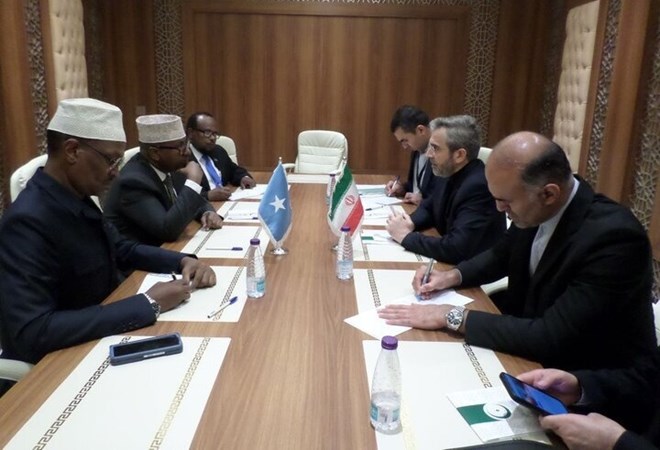
Saturday August 10, 2024

Somalia’s Foreign Minister Ahmed Moallim Fiqi meets with Iran’s Acting Foreign Minister Ali Bagheri Kani on the sidelines of the Organization of Islamic Cooperation (OIC) Executive Committee meeting in Jeddah, Saudi Arabia, to discuss the revival of diplomatic ties and explore avenues for expanding cooperation between the two nations. CREDIT/ IRNA
Mogadishu (HOL) — Iran's Acting Foreign Minister, Ali Bagheri Kani, declared on Thursday that the Islamic Republic is poised to strengthen its ties with Africa, emphasizing that there are no limits to the potential expansion of these relationships. His remarks come as Tehran and Mogadishu appear to be mending a rift that has kept them at odds since 2016.
In a meeting with Somalia's Foreign Minister, Ahmed Moallim Fiqi, on the fringes of the Organization of Islamic Cooperation (OIC) Executive Committee summit in Jeddah, Saudi Arabia, Bagheri Kani underscored Iran's strategic interest in Africa. "We believe Islamic nations must unite to protect shared interests and resist external threats," he said, signalling Tehran's readiness to rekindle relationships across the continent.
For his part, Fiqi voiced his approval of the renewed dialogue, condemning Israel's actions in Palestine and praising Iran's steadfast support for the Palestinian cause. He also highlighted Iran's role in bolstering Somalia's efforts against terrorism, particularly in the fight against the Al-Shabaab insurgency.
The relationship between Iran and Somalia has been anything but straightforward. Back in 2014, there was hope that the two nations might forge closer ties, particularly in parliamentary, industrial, and economic sectors. Yet, by 2016, Mogadishu abruptly severed diplomatic relations with Tehran, accusing it of meddling in Somalia's internal affairs—a move that aligned Somalia with Saudi Arabia in a broader regional power struggle. The same day Somalia announced its break with Iran, it received a $50 million aid package from Riyadh, sparking speculation that financial incentives played a role in Mogadishu's decision.
Fast forward to 2024, and there are signs that the frosty relations might be thawing. In March, Somalia released 33 Iranian fishermen who had been detained for illegal fishing in Somali waters—a gesture widely seen as an olive branch. Furthermore, Somali President Hassan Sheikh Mohamoud extended his condolences to Tehran following the death of Iranian President Ebrahim Raisi in a helicopter crash in May, signalling a potential shift in Somalia's stance towards Iran.
Bagheri Kani's outreach to Somalia fits into a more recent pattern of Iran seeking to expand its influence in Africa, particularly as the continent becomes an increasingly important arena in the geopolitical contest between Tehran and its rivals.
For Iran, Africa represents both an opportunity and a challenge—a chance to build new alliances and markets, but also a region where it must navigate intricate local dynamics and competing interests. Somalia seems to be carefully recalibrating its foreign policy, weighing the benefits of Iranian support against the risks of alienating its traditional Gulf allies.